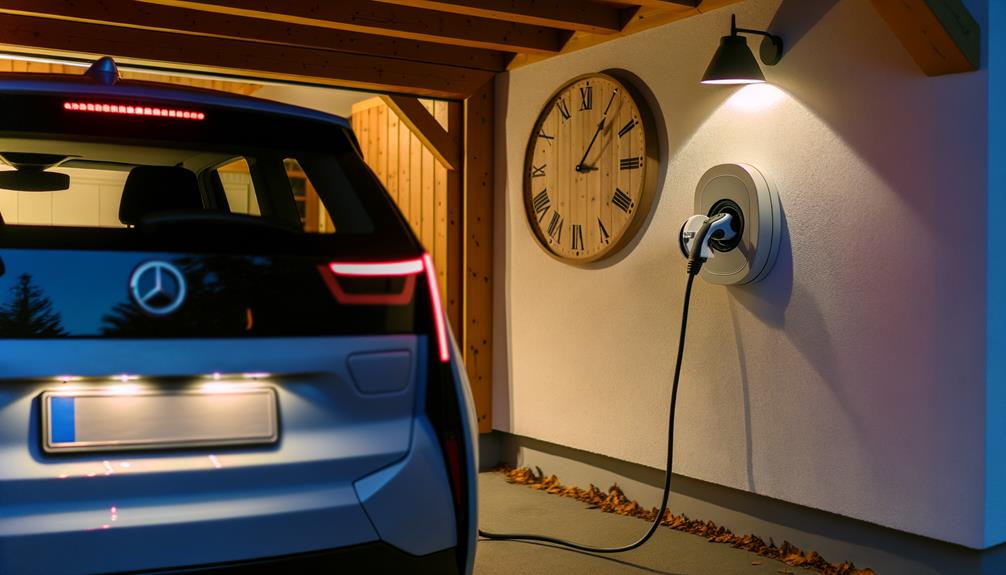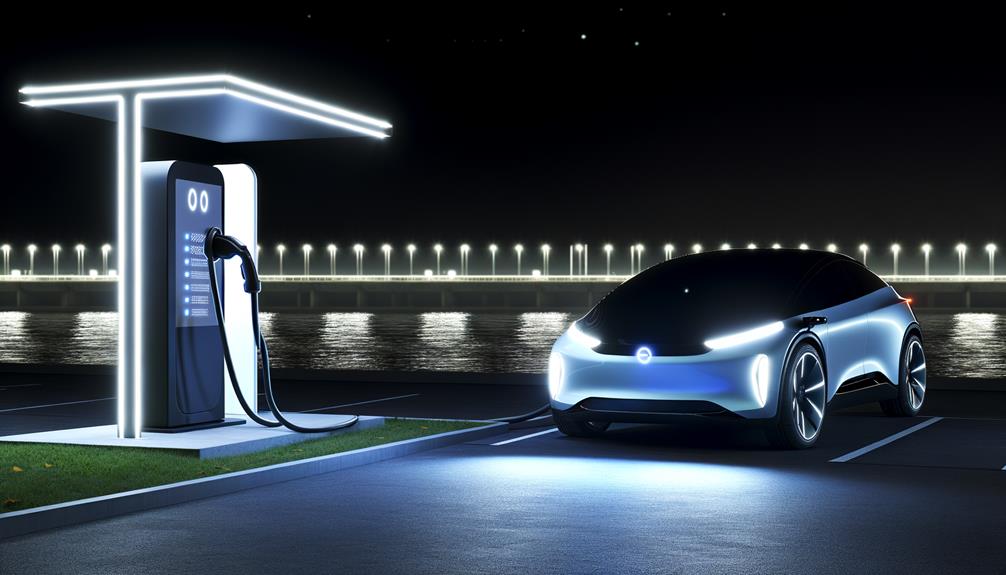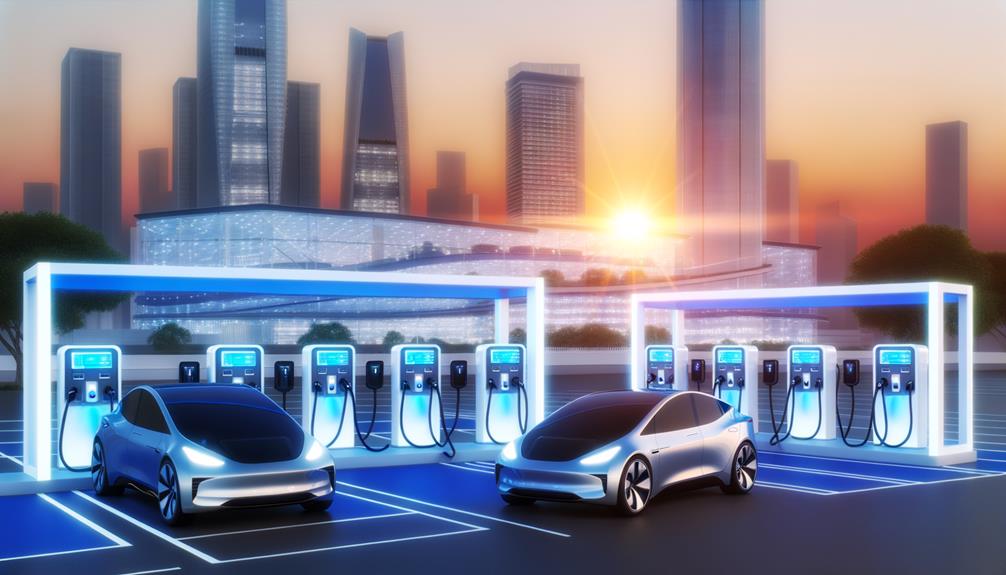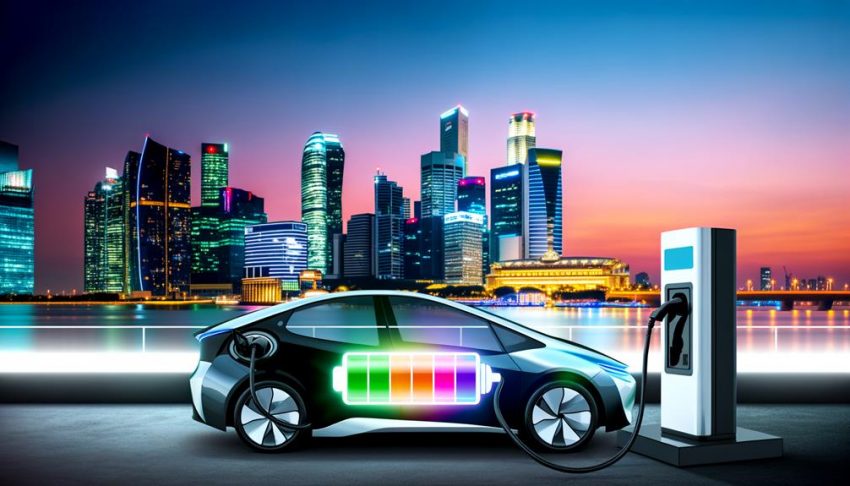You might wonder how long it takes to charge an electric car, and the answer isn't straightforward. It largely depends on the type of charger you're using and the car's battery capacity. For instance, a Level 1 charger can take over a day, while a Level 2 charger usually needs around 4 to 8 hours for a mid-sized battery. But what if you're in a hurry? DC fast chargers might be your solution, getting you up to 80% in about 30 minutes. Curious about the best practices for ideal charging and what the future holds in this space? Let's explore further.
Contents
Charging Time Overview
How long does it take to charge an electric car? Charging times for electric vehicles (EVs) are influenced by several factors, including the EV battery's capacity, the charging speed, and the state of charge. For instance, a typical 60kWh battery can take under 8 hours to charge using a 7kW charger. This assumes a Level 2 charger, commonly found at public charging stations, is used. These chargers can power up your EV to 80% in approximately 30-40 minutes.
Fast charging stations, which offer rapid chargers in the 43-50kW range, can greatly reduce your charging time. These chargers can fully charge your vehicle in around 30-35 minutes, adding roughly 100 miles of range within that period. However, the actual charging speed is dictated by both the vehicle's maximum charging rate and the chargepoint's capacity. Therefore, even if you connect to a high-capacity charger, your EV will only charge as quickly as its internal systems allow.
The state of charge also plays an important role. For example, an EV battery charges more rapidly when it's nearly empty compared to when it's almost full. Environmental factors like temperature can further affect efficiency, making the charging process slower in extreme conditions.
Most EV owners prefer topping up their batteries rather than waiting for a full charge. This habit aligns with the convenience of fast charging and the widespread availability of Level 2 chargers at public locations. By understanding these variables—battery capacity, maximum charging rate, and environmental factors—you can better manage your charging times and keep your electric vehicle ready for the road.
Levels of Charging
When considering how long it takes to charge an electric vehicle, it's important to understand the different levels of charging available. These levels—Level 1 charging, Level 2 charging, and DC fast charging—vary greatly with regard to charging speed and suitability for different scenarios.
Level 1 charging uses a standard 120-volt outlet and adds approximately 2-5 miles of range per hour. This makes it suitable for overnight charging but impractical for a full charge within a day, as it can take over 24 hours. Despite its slower charging times, Level 1 is convenient for home charging when you have ample time.
Level 2 charging operates on a 240-volt circuit, greatly improving charging efficiency. It delivers 10-25 miles of range per hour and usually takes 4-8 hours for a full charge. This makes it ideal for both home installations and public charging stations. Level 2 charging strikes a balance between speed and convenience, offering a practical solution for daily use.
DC fast charging, also known as Level 3 charging, is the quickest option. It provides rapid charging capabilities, adding 180-240 miles of range in as little as 30 minutes. Primarily available at commercial charging stations, DC fast charging is perfect for long trips or when you need a quick top-up. However, the speed comes with higher costs and potential battery wear over time.
Charging speed variability can be influenced by factors such as the vehicle's battery size and state of charge. Larger batteries take longer to charge, and the initial state of charge can greatly impact charging times. Understanding these variables helps optimize the use of different charging levels for your specific needs.
Home Charging Time

For those considering home charging options, Level 2 chargers are the most effective and practical choice. Level 2 chargers, connected to a 240V outlet, can fully charge a typical 60kWh electric vehicle in approximately 8-10 hours. This makes them ideal for overnight charging, ensuring your EV is ready for the next day's drive. Compared to Level 1 chargers, which use a standard 120V outlet and can take over 24 hours to fully charge, Level 2 options considerably reduce the time to charge.
Take the Tesla Model 3 as an example. Using a Level 2 charger, you can achieve a full charge in about 10.5 hours. This efficiency is vital, especially if your daily commute requires a substantial range. The installation of Level 2 chargers at home typically necessitates a dedicated 240V outlet, with costs ranging from a few hundred to several thousand dollars depending on your home's electrical infrastructure. However, the investment pays off regarding convenience and time saved.
Charging efficiency can vary based on several factors, including the battery capacity, state of charge, and environmental conditions. Best charging usually occurs when the battery is between 20% and 80% capacity, which helps prolong battery life. For instance, if your electric vehicle starts charging at 20% capacity, a Level 2 charger can reach 80% in roughly 6-8 hours.
Public Charging Time
When you're using public chargers, the time required can vary widely based on the charger type and your vehicle's capabilities. Level 2 chargers, found commonly in public spaces, typically take 3 to 8 hours for a full charge, whereas a 150kW DC Fast Charger can get you to 80% in just about 30 minutes. Factors like your vehicle's max charging rate and environmental conditions will also impact how quickly you can get back on the road.
Rapid Charging Speeds
Rapid charging speeds, with their impressive efficiency, have revolutionized the way electric vehicle (EV) owners approach long-distance travel. Utilizing rapid chargers, which typically operate between 43-150 kW, you can greatly reduce charging times. For instance, a 60 kWh battery can charge to 80% in about 30 minutes at a 150 kW station. This rapid charging infrastructure is vital for maintaining high charging efficiency and minimizing downtime during trips.
When using a 50 kW rapid charger, you can add approximately 100 miles of range in roughly 35 minutes, making it ideal for quick stops. Ideal charging efficiency is achieved by charging from 20% to 80%, as charging speeds tend to slow down considerably beyond this point. The expanding rapid charging infrastructure is a game-changer, enhancing accessibility and convenience for EV owners.
However, it is important to verify compatibility, as not all vehicles support high-speed charging. While most EVs can utilize rapid chargers, some plug-in hybrids may lack this capability. Ensuring your vehicle's compatibility with high-speed charging stations will maximize your range and reduce the time spent charging, making your long-distance travel more seamless.
Charging Station Availability
Maneuvering the landscape of public charging stations, EV owners will find a range of options primarily featuring Level 2 chargers and increasingly prevalent DC fast chargers. Charging station availability varies greatly depending on your location. With around 55,000 Level 2 chargers spread across the U.S., these public chargers can typically power most electric vehicles to about 80% in roughly 30-40 minutes. However, for quicker top-ups, DC fast chargers are your best bet, adding approximately 180-240 miles of range in just 30 minutes.
| Charger Type | Charging Time |
|---|---|
| Level 2 | 30-40 minutes (80%) |
| DC Fast | 30 minutes (180-240 miles) |
The charging time at public stations is influenced by the type of charger used. Level 2 chargers are more common, but the network of DC fast chargers is rapidly expanding, providing faster charging times. To optimize your charging experience, it's important to verify whether a station requires membership or payment via specific apps beforehand. This guarantees you're prepared for any fees or access restrictions, making your charging experience smooth and efficient. As the infrastructure for electric vehicles continues to grow, the convenience of public charging stations will only improve, bolstering the practicality of EV ownership.
Rapid Charging

For electric vehicle (EV) owners looking to minimize downtime, rapid charging offers a compelling solution. Utilizing Level 3 DC fast chargers, which are typically rated between 43-150 kW, you can charge a 60 kWh electric car to approximately 80% in about 30 minutes. This efficiency is a game-changer compared to slower, Level 1 and Level 2 chargers. However, it's worth noting that charging efficiency decreases when your battery's state of charge dips below 20% or exceeds 80%, making rapid charging less effective in these ranges.
These rapid chargers are primarily available at commercial charging stations, and they're not suitable for plug-in hybrid electric vehicles. One of the key benefits of rapid charging is that it considerably reduces downtime, allowing you to get back on the road quickly. The expanding charging infrastructure is making this technology more accessible, with many EV manufacturers now adopting Tesla's charging port for increased compatibility and ease of use at various charging stations.
However, frequent use of rapid charging can lead to battery degradation over time. This is why it's recommended to reserve rapid charging for long trips rather than daily charging needs. The trade-off between charging speed and long-term battery health is an important consideration. While the infrastructure for rapid charging is expanding, it's essential to balance the convenience of reduced downtime with the potential for accelerated battery wear.
Factors Affecting Speed
Ever wondered why your electric car's charging speed varies? Several factors come into play that can influence how quickly you can get back on the road.
First, the battery capacity, measured in kilowatt-hours (kWh), is essential. Larger batteries naturally take longer to charge fully compared to smaller ones. Additionally, the state of charge (SoC) matters a lot. Charging is most efficient between 20% and 80% capacity. Below 20%, the charging speed is slower to protect the battery, and above 80%, the rate drops to avoid overcharging.
| Factor | Impact on Charging Speed | Notes |
|---|---|---|
| Battery Capacity | Larger capacity, longer charge time | Measured in kWh |
| State of Charge (SoC) | best between 20% – 80% | Slower below 20% and above 80% |
| Power Output | Higher output, faster charge | Influenced by charger type (Level 1, Level 2) |
Your vehicle's maximum charge rate is another key factor. Each EV model has a specific onboard charger limiting the charging speed, regardless of the charger's power output.
Speaking of power output, the type of charger you use makes a substantial difference. Level 1 chargers (120V) are slower compared to Level 2 chargers (240V), which offer higher power outputs and consequently, faster charging speeds.
Environmental conditions also play a role. Extreme temperatures can affect the thermal management systems within the battery, reducing its efficiency to prevent overheating or freezing. This means that on very hot or cold days, your charging speed may be slower.
Future Trends in Charging

Understanding the factors affecting your electric car's charging speed lays the groundwork for exploring future trends in charging technology. One of the most promising developments is the expansion of fast charging networks. These networks are set to reduce charging times considerably, making long trips more feasible and less time-consuming for electric vehicle (EV) owners. As fast charging networks grow, you'll find it easier to access high-speed charging stations, minimizing downtime.
Universal charging standards are another emerging trend. The development of these standards aims to guarantee compatibility across various EV brands and charging stations. This move will streamline the charging process, eliminating the need for multiple adapters and making it easier for you to charge your electric vehicle regardless of the station you visit.
Advancements in battery technology are also on the horizon. These innovations promise to enhance charging speeds remarkably. With next-gen batteries, you'll be able to achieve quicker top-ups and full charges, reducing the overall time spent at charging stations.
Increased investment in renewable energy sources for charging stations is another vital trend. This shift towards using sustainable energy promotes the sustainability of EV infrastructure. You'll not only benefit from cleaner energy but also contribute to reducing the carbon footprint associated with vehicle charging.
Lastly, wireless charging technology is poised to revolutionize the convenience of charging electric vehicles. Imagine simply parking your car over a charging pad without plugging in any cables. This technology, once mainstream, will make charging seamless and further enhance the user experience.
These trends collectively indicate a future where EV charging is faster, more accessible, and more sustainable, fundamentally transforming how you engage with your electric vehicle.
Frequently Asked Questions
How Long Does It Take to Charge Your Electric Car at a Charging Station?
Your charging options vary by charging speeds and battery types. Fast chargers can fully charge in 30 minutes, while public charging takes under 8 hours. Home installation offers convenience, but charging etiquette and energy sources should be considered.
How Long Does It Take to Charge an Electric Car to Go 200 Miles?
To charge your electric car for a 200-mile range, consider charging speed and battery capacity. Home charging (7kW) can take 8-10 hours, while public charging networks with fast chargers (150kW) offer quicker options, often 30-40 minutes.
How Long Does It Take to Charge an Electric Car at Walmart?
At Walmart charging stations, the charging speed varies based on your electric car's battery capacity. With Level 2 chargers, expect 10-25 miles/hour. DC Fast Chargers offer 180-240 miles in 30 minutes. Check Walmart's app for availability and payment options.
How Much Does It Cost to Charge an Electric Car at a Charging Station in the Us?
Charging costs at public charging stations in the U.S. vary, typically between $0.10 and $0.40 per kWh. Charging rates depend on electricity prices, charging networks, and efficiency. Home charging and solar charging offer cost-effective alternatives.
Conclusion
To conclude, charging your electric car depends on the charger type and battery capacity. Level 1 chargers are the slowest, taking over 24 hours, while Level 2 chargers typically need 4 to 8 hours. DC fast chargers can charge up to 80% in just 30 minutes. Ideal charging occurs between 20% and 80% state of charge. Future advancements in charging technology promise even faster and more efficient solutions, further enhancing the electric vehicle experience.
